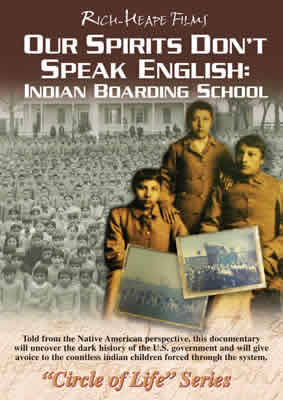Rich-Heape Films brings to us- Told from purely the Native American perspective, “Our Spirits Don’t Speak English” is a true account of the atrocities committed by our own government education policies around the late 19th century. Designed to indoctrinate Native people to what Western society and culture was, the result was catastrophic. For the indigenous children forced into a purely European system, not only was their identity stripped from them, but families were torn apart, languages stolen and spirits crushed. The idea of “Who am I” is a longstanding question for those who went through the system of both mental and sexual abuse.
The documentary is presented by Gayle Ross, a Cherokee Nation Historian and Storyteller. We are given the long history of the boarding schools enacted in 1869. Prior to this system, Native people have always had an in depth, educational, and spiritual learning process, from elders, storytellers, parents, etc. A deep sense of identity, ways of the people, an understanding and respect for what Creator has brought forth to Native people, and respect for others was paramount.
From a Western ideology, Europeans believed that the ways of Native people were backward, blasphemous, uncivilized and just not suitable. Therefore, it was a duty to alter this radical, what was called “savage” mentality. It had to be eradicated and it was with the children where it started. Native children were not allowed to speak their native tongue or practice their ways. Mixing religion with education was also the goal, where converting to Christianity was paired with learning English. Native people could not be “civilized” until they  were taught to be civilized from the European standpoint and placed in Indian Praying Towns (which began in 1674).
were taught to be civilized from the European standpoint and placed in Indian Praying Towns (which began in 1674).
Through Manifest Destiny, it was the purpose of Western society to teach others who know not of Western culture…the ways of “civilization”. Indigenous elders have expressed that, one way of seeing the world, is not the only way. You cannot force a way which does not fit unto another way which has been firmly established. Summarily, force is not the way. With the defeat of Custer at the “Battle of The Greasy Grass” aka Custer’s Last Stand, it was evident that the government learned that indoctrination by military force was purely not the way.
Therefore, Christianizing and initiation of a pacification policy of the Native people went into full swing once reservations were established. This facilitated the work of killing Indian culture. Schools were then established and mistreatment occurred within Indian Boarding schools in the late 19th century. From wearing dunce caps, placed in closets, having your mouth washed out with soap, or being whipped for not complying, discipline was frequently dished out. Belt lines were a popular punishment for disobedience for boys. The boys were to whip the offender as he ran through the line to the end and not let up. “Kill the Indian, and save the Man” was a mode of thinking of the day. Religious instruction, industrial training or vocational training and rudimentary English education were a three tier system of acculturation.
Hair which was regarded as sacred, was cut into bangs, culture, traditional names, songs and language of your nation were strictly forbidden. Guard houses were built, high walls erected, and an overall military or prison atmosphere of control presented itself. Established in 1879 by Captain Richard Henry Pratt in Carlisle, Pennsylvania. The Carlisle Indian Industrial School (1879 – 1918) was a model for schools quickly established out west.
The documentary is a gripping, powerfully moving piece of film, interspersed with historical accounts of those people who were in these schools. Historian accounts tell the facts of what really occurred in these “schools” of brainwashing indoctrination. Definitely, a must see, as it will tug at heart strings and reveal a dark past in our history, where the voices of those who lived through this are finally able to speak. Silence is not golden.
****
Weak: 1 Star Average: 2 Stars Good: 3 Stars Very Good: 4 Stars Excellent: 5 Stars

